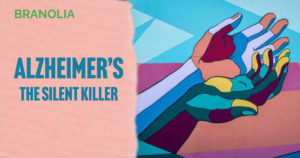Alzheimer’s – The Silent Killer

Definition
Even though the terms “Dementia” and “Alzheimer’s” are often used interchangeably, dementia is not actually a disease. Dementia describes symptoms that affect the brain. Alzheimer’s is the most common form of dementia, — a continuous decline in thinking, behavioral and social skills that affect a person’s ability to function independently, making up 60 to 80 percent of dementia cases.
The disease is named after German psychiatrist and pathologist Alois Alzheimer, who first described it in 1906. As defined by Mayo Clinic, the world’s leading academic medical center, Alzheimer’s Disease is a progressive neurologic disorder that causes the brain to shrink (atrophy) and brain cells to die.
Recent Findings
As per ADDI, (Alzhemer’s Disease Data Initiative), a renowned Medical Research Centre USA, in their report published in November 2021,says more than 55 million people worldwide are living with Alzheimer’s disease and related dementias.
The total number of people with dementia is projected to reach 82 million in 2030 and 152 million in 2050.Interestingly,Alzheimer’s is often referred to as a “woman’s disease.” Recent facts show that two-thirds of all Alzheimer’s cases are in women. Researchers are still investigating why women are more likely to develop Alzheimer’s than men are. (https://www.beingpatient.com/alzheimers-disease-facts/ Being Patient is the leading online community for Alzheimer’s & dementia patients & caregivers)
As per Life expectancy varies depending on the person or when someone developed the disease. The Mayo Clinic reports that in general, most people live for 3 to 11 years after they are diagnosed.
The World Health Organization estimates (2019 data)that worldwide it costs $1.3 trillion per year to treat people with Alzheimer’s disease or related dementias. The WHO predicts that worldwide, dementia deaths will increase by more than 40 percent between 2015 and 2030.
In India, more than 4 million people are estimated to be suffering from Alzheimer’s and other forms of dementia, giving the country the third highest caseload in the world, after China and the USA.
Symptoms
The early signs of the disease include forgetting recent events or conversations. As the disease progresses, a person with Alzheimer’s disease will develop severe memory impairment and lose the ability to carry out everyday tasks.
Ayurveda Can Help
Brahmi is a medicinal herb, known to be widely beneficial in boosting memory and preventing causes of dementia and highly recommended by Indian Ayurveda, and other alternative medicines. The latest medical research corroborates Ayurveda’s claim that Brahmi is a brain-rejuvenating plant and useful for Alzheimer’s patients. It has a significant memory-promoting effect. The memory-enhancing properties of Brahmi are due to the presence of bacoside A, Sbio-chemical which helps in re-building damaged brain tissues
(Ref Dhanasekaran M, Tharakan B, Holcomb LA et al. Neuroprotective mechanisms of ayurvedic antidementia botanical Bacopa monniera. Phytother Res. 2007;21:965-969)
BRANOLIA for healthy memory, powered by Brahmi
Branolia is an ayurvedic tonic based on the knowledge from the ancient ayurvedic texts on the regenerative and memory enhancement power of the Brahmi. Brahmi in Branolia helps increase memory, concentration, and thinking power and keeps the body healthy and tuned.
Along with Brahmi, Branolia contains Satamuli, Berela, Ashwagandha, Jastimodhu, and Alkushi which have high brain rejuvenation properties.
Ingredients in Branolia helps students enhance academic performance, for the middle-aged it keeps the brain and body tuned for the daily rigors and for the aged it helps manage age-related mental degeneration.

